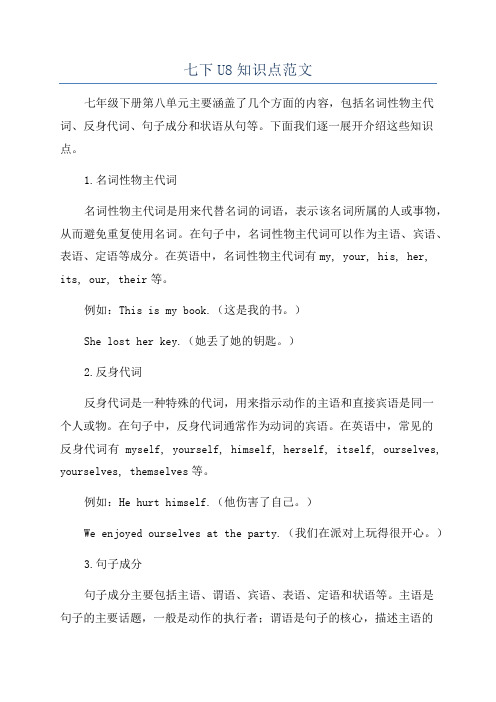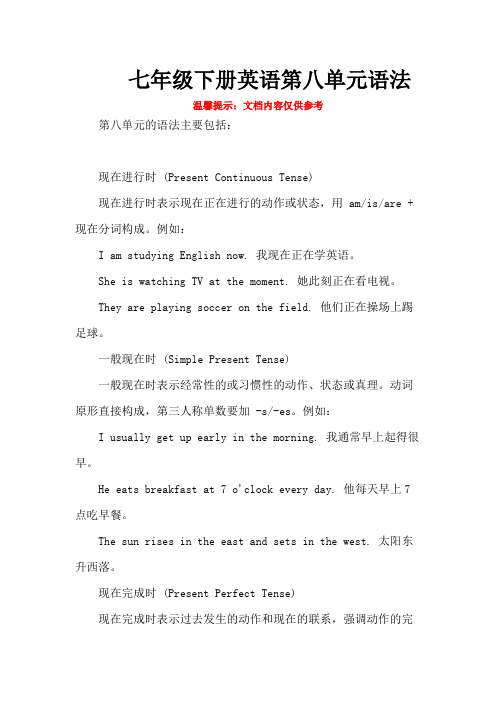广州版7年级英语下册语法 U8时间状语从句
七下U8知识点范文

七下U8知识点范文七年级下册第八单元主要涵盖了几个方面的内容,包括名词性物主代词、反身代词、句子成分和状语从句等。
下面我们逐一展开介绍这些知识点。
1.名词性物主代词名词性物主代词是用来代替名词的词语,表示该名词所属的人或事物,从而避免重复使用名词。
在句子中,名词性物主代词可以作为主语、宾语、表语、定语等成分。
在英语中,名词性物主代词有my, your, his, her, its, our, their等。
例如:This is my book.(这是我的书。
)She lost her key.(她丢了她的钥匙。
)2.反身代词反身代词是一种特殊的代词,用来指示动作的主语和直接宾语是同一个人或物。
在句子中,反身代词通常作为动词的宾语。
在英语中,常见的反身代词有myself, yourself, himself, herself, itself, ourselves, yourselves, themselves等。
例如:He hurt himself.(他伤害了自己。
)We enjoyed ourselves at the party.(我们在派对上玩得很开心。
)3.句子成分句子成分主要包括主语、谓语、宾语、表语、定语和状语等。
主语是句子的主要话题,一般是动作的执行者;谓语是句子的核心,描述主语的动作或状态;宾语接在动词后面,说明主语动作的承受者;表语用来说明主语的特征或状态;定语用来修饰名词或代词;状语用来说明时间、地点、方式、原因等情况。
例如:She is reading a book.(她正在读一本书。
)They gave him a present.(他们给了他一个礼物。
)4.状语从句状语从句是从句的一种,用来修饰主句中的动词、形容词、副词等,在句子中起着状语的作用。
状语从句通常由连词引导,例如when, while, if, because, although等。
Although he is busy, he helps others.(虽然他很忙,但他仍然帮助别人。
广州英语七年级下册 G7 U8

All over the world: 全世界
In a lively way: 用生动的方式 In a boring way
3. I am proud of my TV programme-it has lasted for more than 50 years!
Be proud of: 以…为傲/自豪
last for+时间: 持续
Some key points
Review
Can:可以;can’t:不可以/不可能 May: 可以/可能;may not: 不可以/可能不 Must: 必须; mustn’t :禁止 Must-----needn’t/don’t have to…不必
must 1. If you ____ go, at least wait for the rain stops. 2. Can we run across the road now? –No, we _______. mustn’t We have to wait until the light turns green. Must 3. _____ we hand in our poster today, Miss Li? canhand in tomorrow. --No, you needn’t . You ____ 4. Would you like to go to play basketball with us this afternoon? I’d love to. But I’m afraid I can’t ____. I have too much HW to do. musn’t swim 5. Visitors ___________ in this part of the sea, It is dangerous.
广州版7年级英语下册语法-U8时间状语从句

广州初一英语Unit 8语法【精讲点拨】when引导的时间状语从句一. 概念:在复合句中,由时间连接词引导的状语从句叫做时间状语从句。
二.1..从句动作在主句动作前发生,只用when。
When he had finished his homework,he took a short rest.(finished先发生)当他完成作业后,他休息了一会儿。
When I got to the airport,the guests had left.(got to后发生)当我赶到飞机场时,客人们已经离开了。
2.在将来时从句中,常用when,且从句须用一般现在时代替将来时。
You shall borrow the book when I have finished reading it.在我读完这本书后,你可以借阅。
When the manager comes here for a visit next week,Ill talk with him about this.下周,经理来这参观时,我会和他谈谈此事。
三.种类:1.由when, while, as引导的时间状语从句。
(1)when引导的从句的谓语动词可以是延续性的动词,又可以是瞬时动词。
动作既可和主句的动作同时发生又可在主句的动作之前或之后发生,并且when有时表示“就在那时”。
When she came in, I stopped eating. 她进来时,我停止吃饭。
(瞬时动词)When I lived in the countryside, I used to carry some water for him.当我住在农村时,我常常为他担水。
(延续性的动词)(2)while强调主句的动作与从句的动作同时持续地进行,用于这一用法时while引导的时间状语从句和主句中的谓语动词必须是延续性动词,或者主句的动作发生在从句动作的进行过程中,主句中的谓语动词通常是非延续性动词,并且while有时还可以表示对比。
初中英语知识点归纳状语从句的分类和用法

初中英语知识点归纳状语从句的分类和用法状语从句是英语语法中重要的一部分,它用来修饰主句的动作或描述情况的,在句子中起着状语的作用。
状语从句分为时间状语从句、条件状语从句、原因状语从句、目的状语从句、结果状语从句、方式状语从句和比较状语从句等。
下面将对初中英语中常见的状语从句分类和用法进行归纳。
一、时间状语从句时间状语从句用来表示动作或事件发生的时间,包括连词when (当...时候),while (在...时候),before (在...之前),after (在...之后),as (当),since (自从),until (直到)等。
时间状语从句一般放在主句之前或者之后。
例如:- When I was young, I used to play soccer with my friends. (当我年轻的时候,我常常和朋友们踢足球。
)- After she finished her homework, she went to bed. (她完成作业之后,去睡觉了。
)二、条件状语从句条件状语从句用来表示主句动作的条件或前提,包括连词if (如果),unless (除非),in case (以防),as long as (只要),provided/providing (只要)等。
条件状语从句一般放在主句之前。
例如:- If it rains tomorrow, we will stay at home. (如果明天下雨,我们就在家呆着。
)- Unless you work hard, you won't pass the exam. (除非你努力学习,否则你就不能通过考试。
)三、原因状语从句原因状语从句用来表示主句动作或情况的原因,包括连词because (因为),as (因为),since (因为),for (因为),now that (既然)等。
原因状语从句一般放在主句之前。
例如:- Because it was raining, we stayed at home. (因为下雨,我们呆在家里。
七年级下册英语第八单元语法

七年级下册英语第八单元语法温馨提示:文档内容仅供参考第八单元的语法主要包括:现在进行时 (Present Continuous Tense)现在进行时表示现在正在进行的动作或状态,用 am/is/are + 现在分词构成。
例如:I am studying English now. 我现在正在学英语。
She is watching TV at the moment. 她此刻正在看电视。
They are playing soccer on the field. 他们正在操场上踢足球。
一般现在时 (Simple Present Tense)一般现在时表示经常性的或习惯性的动作、状态或真理。
动词原形直接构成,第三人称单数要加 -s/-es。
例如:I usually get up early in the morning. 我通常早上起得很早。
He eats breakfast at 7 o'clock every day. 他每天早上7点吃早餐。
The sun rises in the east and sets in the west. 太阳东升西落。
现在完成时 (Present Perfect Tense)现在完成时表示过去发生的动作和现在的联系,强调动作的完成。
用 have/has + 过去分词构成。
例如:I have finished my homework. 我已经完成了我的作业。
She has lived in Beijing for five years. 她已经在北京住了五年。
They haven't seen the movie yet. 他们还没看过这部电影。
一般过去时 (Simple Past Tense)一般过去时表示过去的动作或状态,常与表示过去的时间状语连用。
动词过去式构成。
例如:I went to the park yesterday. 我昨天去了公园。
She studied English in high school. 她在高中学过英语。
七年级英语下册Module8Storytime语法篇

Module 8____________________________________________________________________________________________________________________________________________________________一般过去时(2)规则动词的一般过去时一般过去时表示过去某一时间发生的动作或存在的状态、过去的特征、过去的行为等。
和一般过去时连用的时间状语有:last...\yesterday\....ago\in the past\the other day\at that time\just now\in 1990等。
如:I was born in 2000.He went to the museum yesterday.We climbed the mountain last week.规则动词过去式的变化规则一般过去时的肯定、否定、疑问和回答方式的变化如下:It rained heavily. It didn’t (didn’t)rainheavily.Did it rain heavily? Yes, it did.No, it didn’t. We played footballyesterday.We didn’t (didn’t) playfootball yesterday.Did we play footballyesterday?Yes, we did .No, we didn’t. They playedbasketball lastweek.They didn’t (didn’t)play basketball last week.Did they playbasketball last week?Yes, they did.No, they didn’t.单项选择1.I __________tennis yesterday.A. playB. will playC. playedD. are playing 答案:C解析:考查一般过去时,根据yesterday可知答案是C。
英语七下-Unit8教案(语法)
(2) while除了引导时间状语从句外,还引导 对比关系的并列句,表示“然而”;也可在句 首引导让步状语从句,表示“虽然”。如: I like watching TV, while he likes reading. 我喜欢看电视,而他喜欢读书。 While he has his own car, he often uses mine. 尽管他自己有车,他却常用我的。
9. I will talk with her __w_h_i_l_e____ (after, while) we are having dinner. 10. The noise in the street didn’t stop ___u_n_t_i_l___ (until, after) it was midnight.
_____ you do. (2019云南)
A. until B. if C. when D. since
( B )5. —Remember to keep the dog on a leash(狗链) _____ you walk it, honey! —Sure. I won’t let it hurt others. (2019东营) A. until B. while C. after D. since
3. My grandfather was not at home ___w_h_e_n____ (when, until) I came to visit him. 4. Please turn off the lights __b_e_f_o_r_e___ (before, after) you leave the classroom. 5. I will tell him the news ____a_s__s_o_o_n__a_s____ (as soon as, until) he comes back.
七年级下unit8知识点
七年级下unit8知识点Unit8是初中英语教学中的一个重要阶段,涵盖了多个知识点。
本文将详细介绍七年级下Unit8的知识点,帮助读者更好地掌握这些知识,提高英语能力。
一、动词的ing形式动词的ing形式是英语中的一个重要知识点,代表着动作或状态的进行。
1. 形成方式:动词+ing(例如:play—playing)2. 用法:(1)表示正在进行的动作(例如:She is watching TV)(2)表示通常、经常或习惯性的动作(例如:I enjoy playing basketball.)(3)作定语或表语(例如:The dancing girl is very beautiful.)二、一般现在时态一般现在时态是英语中最基础的时态,具有多种用法。
1. 形式:主语+动词原形(第三人称单数需加s)2. 用法:(1)表示现在正在进行的动作(例如:I am listening to music.)(2)表示经常性的、习惯性的或普遍性的事情(例如:She often watches TV.)(3)表示判断、命令或表示常态(例如:The sun rises in the east.)三、时间状语时间状语在英语中也是重要的语法 unit,用来表达动作、事情发生的时间或持续的时间等。
1. 常见时间状语(时间点):(1)now 现在(2)today 今天(3)tonight 今晚(4)tomorrow 明天(5)yesterday 昨天(6) last week/month/year 上周/上月/去年2. 常见时间状语(时间段):(1)all day 整天(2)every day 每天(3)once a week/month/year 每周/月/年一次(4)in the morning/afternoon/evening 在早上/下午/晚上四、形容词的比较级和最高级形容词的比较级和最高级涉及到了英语中的等级语法,以便用来描述某两个或多个人或事物之间的差异。
英语七年级下册牛津版Unit 8 第3课时 语法
ห้องสมุดไป่ตู้
8
【拓展 3】before 在……之前 如: The boy washed his hands before he had breakfast. 这 个男孩吃早饭前洗了手。
10
二、used to do 和 did not use to 的用法 used to+do:“过去常常”,表示过去习惯性的动作或状态,但如 今已不存在。
(肯定句)I used to take a walk after supper.(过去常常晚饭后 散步,现在不去散步了)
11
(疑问句)Did you use to take a walk after supper? 你过去常 常晚饭后散步吗?
2
【解析 2】有“正……忽然……”的含义,表示突然发生某事。如: I was going to leave my office when the telephone rang. 我正要离开办公室时,忽然电话铃响了。
注意:在这种句型中一般不可把 when 放在句首。
3
► “when”引导的时间状语从句与主句的时态 注意:when 从句既可以放在主句前面, 也可以放在主句后面。
6
【拓展】其他的时间状语从句:as soon as, while, before, after, until 等从属连词引导的状语从句。时间状语从句中的谓语动 词不能用一般将来时,只能用一般现在时表示将来发生 的动作或存在的状态。
7
【拓展 1】as soon as 表示“一……就……” 如: I will call you as soon as I arrive there. 我一到达那儿, 就给你打电话。
七年级下册英语第八单元语法
七年级下册英语第八单元语法语法 there be 句型there be句型表示“某地或某时有某物或某人”。
句中的there 是一个引导词,没有实际意义;be是句子的谓语动词,句子中的be 动词必须和后面所跟的名词在数上保持一致。
L、there be 句型的基本结构(1)肯定句:There be+主语+地点状语/时间状语Eg:There are six pencils in the pencil-box.文具盒里有六支铅笔。
(2)否定句:There be+not+主语+地点状语/时间状语。
Eg:There are not six pencils in the pencil-box.文具盒里没有六支铅笔。
(3)一般疑问句:Be there+主语+地点状语/时间状语?答语:Yes,there be./No, there be+notEg:-Are there six pencils in the pencil-box?文具盒里有六支铅笔吗?-Yes,there are./No, there aren’t.是的,有。
/不,没有。
(4)对数量提问:一般有两种提问方式,如果主语是可数名词,无论是单数还是复数,都用How many+可数名词复数+are there+介词短语?”;如果主语是不可数名词,则用“How much+不可数名词+is there+介词短语?”。
Eg:There are twelve months in a year.一年有12个月。
(5)特殊疑问句There be句型的特殊疑问句是用“特殊疑问词+一般疑问句”构成的,有以下三种形式:①对主语提问时用who或者what;主语是人时用who,是物时用what。
Eg:There is a bird in the tree.→What's in the tree?树上有什么?②there在口语中常常省略。
无论原句的主语是单数还是复数,对其提问时一般都用be的单数形式(回答时却要根据实际情况来决定)。
- 1、下载文档前请自行甄别文档内容的完整性,平台不提供额外的编辑、内容补充、找答案等附加服务。
- 2、"仅部分预览"的文档,不可在线预览部分如存在完整性等问题,可反馈申请退款(可完整预览的文档不适用该条件!)。
- 3、如文档侵犯您的权益,请联系客服反馈,我们会尽快为您处理(人工客服工作时间:9:00-18:30)。
广州初一英语Unit 8语法【精讲点拨】when引导的时间状语从句一. 概念:在复合句中,由时间连接词引导的状语从句叫做时间状语从句。
二.1..从句动作在主句动作前发生,只用when。
When he had finished his homework,he took a short rest.(finished先发生)当他完成作业后,他休息了一会儿。
When I got to the airport,the guests had left.(got to后发生)当我赶到飞机场时,客人们已经离开了。
2.在将来时从句中,常用when,且从句须用一般现在时代替将来时。
You shall borrow the book when I have finished reading it.在我读完这本书后,你可以借阅。
When the manager comes here for a visit next week,Ill talk with him about this.下周,经理来这参观时,我会和他谈谈此事。
三.种类:1.由when, while, as引导的时间状语从句。
(1)when引导的从句的谓语动词可以是延续性的动词,又可以是瞬时动词。
动作既可和主句的动作同时发生又可在主句的动作之前或之后发生,并且when有时表示“就在那时”。
When she came in, I stopped eating. 她进来时,我停止吃饭。
(瞬时动词)When I lived in the countryside, I used to carry some water for him.当我住在农村时,我常常为他担水。
(延续性的动词)(2)while强调主句的动作与从句的动作同时持续地进行,用于这一用法时while引导的时间状语从句和主句中的谓语动词必须是延续性动词,或者主句的动作发生在从句动作的进行过程中,主句中的谓语动词通常是非延续性动词,并且while有时还可以表示对比。
While my wife was reading the newspaper, I was watching TV.I met her while I was at school.I like playing football while you like playing basketball.(3)as引导时间状语从句时表示“当……时,一边……一边……”,侧重表示两个动作同时发生(包括一个主语同时进行两个动作),或者一种动作随着另一种动作的变化而变化。
As the time went on,the weather got worse.(as表示“随着……”之意)The atmosphere gets thinner and thinner as the height increases.随着高度的增加,大气越来越稀薄。
The sad mother sat on the roadside,shouting as she was crying.伤心的妈妈坐在路边,边哭边叫。
As we was going out, it began to snow.当我们出门时,开始下雪了。
(as强调句中两个动作紧接着先后发生,而不强调开始下雪的特定时间)2.从句动作和主句动作同时发生,且从句动作为延续性动词时,when,while,as都可使用。
①When /While /As we were dancing,a stranger came in.(dance为延续性动词)当我们跳舞时,一位陌生人走了进来。
②When /While /As she was making a phonecall,I was writing a letter.(make为延续性动词)当她在打电话时,我正在写信总结:when从句的谓语动词可以在主句谓语动作之前、之后或同时发生;while和as从句的谓语动作必须是和主句谓语动作同时发生。
四、其他几种时间状语从句:1.由before和after引导的时间状语从句。
before引导的时间状语从句表示主句动作发生在从句动作之前。
从句不用否定的谓语形式。
从句位于主句之后时,before有时译成“才;就”。
还要注意主句和从句的时间关系。
当主句用将来时,从句总是用现在时;从句用过去时,则主句多用过去完成时,以此来体现动作发生的先后顺序。
after表示主句动作发生在从句动作之后,主句和从句的时间关系正好与before相反。
如:It will be four days before they come back.他们要过四天才能回来。
My father had left for Canada just before the letter arrived.我父亲恰好在信到达之前去加拿大了。
After we had finished the work, we went home.完成工作之后,我们回家了。
2.由till或until引导的时间状语从句。
till和until一般情况下两者可以互换,但是在强调句型中多用until。
并且要注意的是:如果主句中的谓语动词是瞬时动词时,必须用否定形式;如果主句中的谓语动词是延续性动词时,用肯定或否定形式都可以,但表达的意思不同。
till不可以用在句首,而until 可以放在句首。
I didn't go to bed until(till)my father came back.直到我父亲回来我才上床睡觉。
I worked until he came back.我工作到他回来为止。
I didn't work until he came back.他回来我这才开始工作。
3.由since引导的时间状语从句。
“自从……以来”,或“自从……以后”, since引导的从句的谓语动词可以是延续性的动词,又可以是瞬时动词。
主句通常用现在完成时态,从句谓语动词用一般过去时,。
但在It is +时间+since从句的句型中,主句多用一般现在时。
I have been in Beijing since you left.自从你离开以来,我一直在北京了。
It is five months since our boss was in Beijing.我们老板离开北京有五个月了。
4.由as soon as, immediately, directly, instantly, the moment, the instant, the minute, 等引导时间状语从句。
这些连词都表示“一……就”。
例如:The moment I reach Canada, I will ring you up.我一到加拿大,就给你来电话。
5.由by the time引导的时间状语从句。
注意时态的变化:在一般情况下,如果从句的谓语动词用一般过去时,主句的谓语动词用过去完成时;如果从句的谓语动词用一般现在时,主句的谓语动词用将来完成时。
By the time you came back, I had finished this book.到你回来时,我已经写完这本书了。
By the time you come here tomorrow, I will have finished this work.你明天来这儿的时候,我将已经完成此工作了。
课堂练习1. By the end of last term , I___ten books.A had finished reading B.have finish readingC.had finish to readD.finish read2.I won't believe you__ I have seen it with my own eyes.A. beforeB. untilC. afterD. when3.___ he came to study in the university, he has made much progress in the study of English.A. WhileB. WhenC. SinceD. After课后练习在下列各句的空格中填入适当的连词1._________ he comes tomorrow, I shall ask where he has been.2._________ he was speaking, everybody listened carefully.3.I saw her just _________ she was getting off the train.4.Have a good look at that man _________ you pass him.5.It was already eight o'clock _________ we got there.6. I was about to go out _________ a visitor came.7.We'll go to the country at the beginning of June, ______ the summer harvest will start.8. He learned to speak German _________ he was in Berlin.9. Henry is in charge of the office ________ Mr. Smith is away.10. I listen to the recorder _________ I have time.11. He had learned Chinese _________ he came to China.12. _________ the work was done, we sat down to sum up experience.13. I haven't seen him _________ he moved to the other side of the town.14. I waited ________ he came back.15. It was not ________ he took off his eyeglasses that I recognized him.16. She likes everything to be in place ________ she starts to work.17. The thieves ran away _________ they caught sight of the police.18. They decided to go back home _________ their money ran out.19. We played outside till sunset, _________ it began to rain。
